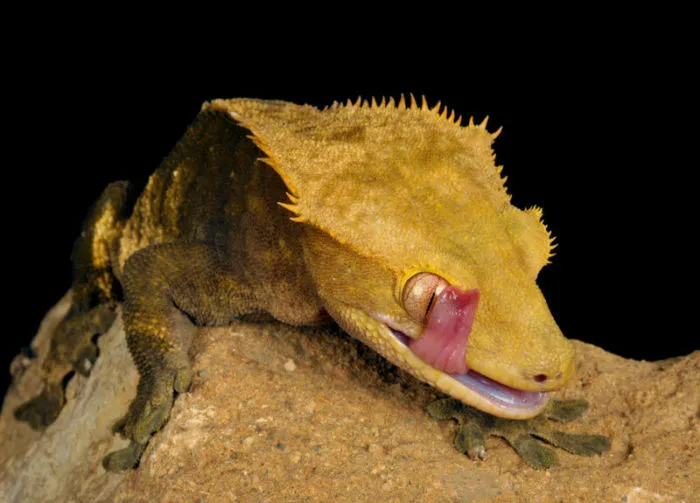 If you are on the hunt for a low-maintenance and easy-going pet, then you don’t need to look any further than crested geckos.
If you are on the hunt for a low-maintenance and easy-going pet, then you don’t need to look any further than crested geckos.
They’re very popular to keep as pets and perfect especially if you have children. However, sometimes things don’t always go so smoothly.
Some people notice that their crested geckos have grown aggressive, and have even taken on behaviors such as biting, which is completely uncharacteristic of this animal.
There are several potential reasons for such behavior, some of which might include the fact that you just brought it home, it is being territorial, hormonal changes, and more. Be sure to check with the vet for potential illnesses if this unusual behavior continues.
Once again, it’s not normal for crested geckos to act aggressively, so you will definitely want to monitor your pet’s behavior. In this article, we will discuss some of their normal and not-so-normal behavior patterns, why your gecko is aggressive, and what you should do.
Crested Gecko Behavior – Before We Start
An animal once believed to be extinct, crested geckos have grown in popularity over the years due to the fact that they are so easy to take care of. These animals will live a rather long time- between 15 and 25 years- and they enjoy climbing and hiding.
So, it is necessary that you make sure you provide all the right accommodations for your new pet. If the enclosure you purchase also has plenty of areas where the gecko can hide, then you will not experience any difficulties when caring for this animal.
They enjoy solitude, so crested geckos will also make perfect pets for those who have somewhat busier lifestyles. We explain how social (or unsocial) they are in this article.
Always be sure to check your crested gecko for any potential behavioral changes or health issues. They also require a special diet filled with the necessary vitamins and nutrients to stay healthy.
Again, these pets are very calm and laid-back, and you’re probably not going to notice it moving around too much throughout the day because they are crepuscular.
Crested geckos require minimal maintenance and are the perfect pet for those who want a unique yet low-maintenance companion.
9 Signs of Aggression in Crested Geckos
With all that being said, there may be times when you notice unusual behavior from your crested gecko. Some demonstrations of aggressive behavior might include:
- Biting you when you try to feed it
- Following every move you make
- Swishing its tail
- Making squeaking noise (We show you all the possible reasons for squeaking in this article)
- Not allowing you to approach it for feeding
- Jumping on the glass when you approach the enclosure
- Not eating enough food
- Eating too much
food - Showing aggression while eating and then quickly calming down.
There are plenty of other ways in which you might notice that your crested gecko has become aggressive, especially if you decided to include another gecko in the enclosure or if you have other pets at home.
You may see that your gecko is jumping on the glass and clearly showing aggression when one of your other pets approaches, too.
As we said, these are not normal behaviors. You should especially take note of what is going on if your gecko starts to bite you.
So why is your gecko acting aggressive? Should you be worried? Let’s take a look.
Why Geckos Might Become Aggressive – 11 Reasons
The good news is that geckos might not necessarily become aggressive for serious reasons. You might not even require a visit to the vet. If you have noticed any of the behaviors mentioned in the previous section, those are good indicators that something isn’t quite right.
Let’s explore the different reasons why crested geckos might be aggressive.
1. You just got your crested gecko.
It’s safe to say that many animals might act a little bit strange in the very beginning when you initially bring them home. So if you happen to notice some aggression on its behalf and you just got the pet, it might be worth waiting a little while for your crested gecko to get used to you.
Try not to approach the enclosure too much, and give your gecko around 10 days or so to get used to its surroundings.
2. It feels too exposed in the enclosure.
As we said before, crested geckos love to climb and hide. Make sure that you have plenty of branches, leaves, and other things set up in the enclosure that your crested gecko can explore with and hide in.
And don’t be alarmed if your Crestie is hiding all the time. We show you in this article why that is totally okay.
Some people also cover the sides of the 
3. You have recently changed the tank ’s setup.
If you’ve recently changed out all the decoration that is in the
Once again, just give your gecko several days to get used to the new setup and try to avoid approaching the cage as much as possible.
Also, make sure that you do not leave the lights on during the night in your Crested Gecko’s habitat. We show you why here!
4. Your crested gecko is shedding.
Crested geckos, like many other lizards, go through a time period in which they shed. This is a time when geckos want their own privacy and do not want to be bothered. You might notice that your gecko isn’t eating as much or that it has become aggressive when you approach it.
Showing aggression while shedding is completely normal and all you have to do is wait for it to pass.
5. You aren’t taking care of it correctly.
This might be a very plausible cause, especially if you’re someone who has no experience with lizards or geckos of any kind. Definitely read up on proper handling of crested geckos, watch plenty of videos, and ask for advice if necessary.
Some of the most common mistakes that people make are making fast movements or putting their hands over the crested gecko. This will lead to the animal feeling vulnerable and the need to defend itself.
Geckos like to sleep during the day, so try to only approach the
Also, do not handle your Crested Gecko too often. In this article, we explain how often and how long you should handle your Crestie.
6. It was not treated well in the past.
Just like any past trauma might affect our future behavior, the same goes for crested geckos. If you got yours from a pet shop, it’s highly likely that the gecko was not treated well by the shop owners.
It might not have been provided with the proper
You can surely allow your gecko to trust you with time and patience.
7. Your crested gecko is experiencing hormonal changes.
As with all animals, your gecko’s behavior might change as it experiences hormonal changes or the mating season. When your gecko gets older- between 12 and 18 months- it will start to go through hormonal changes that could lead to aggression and biting.
If it’s the mating season, some of the behaviors that you will associate with aggression are actually its attempts to find a mate.
For example, if your crested gecko bites your finger, what it’s actually doing could be the mating dance. It will then start to squeak and jump at the glass because it wants to find a mate.
The breeding season tends to take place between March and November, and the best thing that you can do is simply wait.
8. Something is not right with its diet.
You will want to consult with the vet or other specialists regarding what foods are best for your gecko. But, of course, not providing it with the necessary
This is especially true if there is a lack of live bugs in its diet. Try to include live bugs in its diet more often so the gecko can make use of the hunting instincts.
Otherwise, it might be thirsty or hungry, so make sure that you follow a routine as outlined by the vet.
We also recommend reading the following articles:
- Can Crested Geckos eat apples?
- Can Crested Geckos eat bananas?
- Can Crested Geckos eat tomatoes?
- Can Crested Geckos eat strawberries?

9. Your crested gecko has started to associate you with food .
Sometimes, crested geckos will become extremely excited when it’s time for them to eat, which could cause it to mistake your fingers for bugs and try to bit them. This is why it’s important to move slowly to prevent your gecko from mistaking your fingers for bugs.
Also, try to open the cage at times when you’re not feeding the gecko so that it won’t associate that with feeding. Don’t handle
10. It’s acting territorial.
This can be the case if there are other animals in your home, especially another crested gecko. These animals prefer their solitude and do not want to feel threatened by other crested geckos. If it smells another crested gecko on you, there is a chance that it might grow aggressive.
If your other pets are always near your gecko’s
11. Your crested gecko has health problems.
And finally, it is also possible that your gecko is dealing with some health problems, which will also be a cause for aggression. If nothing else seems to be working, then make sure that you take your gecko to the vet for a checkup.
The gecko might be injured or it might be facing other problems internally.
What to Do If Your Gecko is Aggressive
While we’ve established that aggression is certainly not normal behavior for a crested gecko, it’s also not a reason for you to worry. In most cases, your gecko is aggressive due to things that can easily be changed or that might require some patience and work on your behalf.
Change some things in their environment.
If you suspect that your gecko is aggressive because the enclosure is in an area of your home that is highly active, it might be worth taking the gecko to another room in your home that your children and other pets might not frequent as much.
You can also consider purchasing your gecko new toys that will allow it to climb, hide, and play as it wants to. It is also possible that you cover the enclosure using cardboard or other material so that your gecko doesn’t feel as exposed.
Wait.
Honestly, the best thing for you to do is wait. Whether this is because you just bought your gecko, it’s going through the mating season, or anything else, you will want to give your gecko some time.
Patience is the best way for you to make your gecko trust you and to change its behavior. Make sure that you do everything slowly, whether it be how you approach the cage and how you feed your gecko.
Stick your arm in slowly and in a fist, then slowly open your fist so that the gecko does not think that your fingers are bugs. It is recommended that you wait between 10 and 20 days to notice any changes in your gecko’s behavior.
It is possible that you may need to wait longer than that, but the important thing is that waiting will allow you to properly note what the problem is.
Take your crested gecko to the vet.
If the problem doesn’t seem to stem from anything behavioral or in its environment, it is definitely worth taking your crested gecko into the vet for a checkup. There might be something going on internally or your gecko might have suffered an injury.
When they’re stressed, their tails might drop or they might injure themselves from running away from you, so you might not even notice that something is wrong physically. The vet will give you further advice on what to do, including necessary treatments or dietary changes.
Again, taking care of crested geckos is easy and they make great pets. If you notice anything unusual, though, patience is the key! In time, your gecko will grow used to you and come to see you as a friend and not a foe.
- Enchi Ball Python: A Unique and Stunning Morph of Python regius - March 27, 2025
- Emerald Tree Monitor: The Enigmatic Green Guardian of the Rainforest - March 26, 2025
- The Egyptian Cobra (Naja haje): A Fascinating Serpent - March 25, 2025
